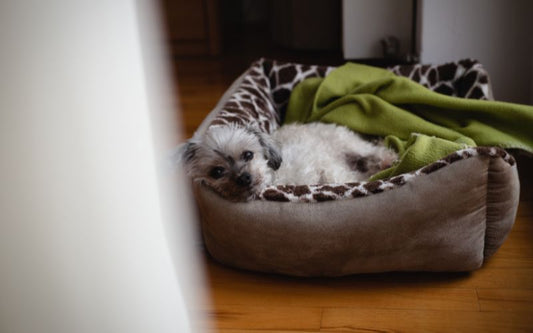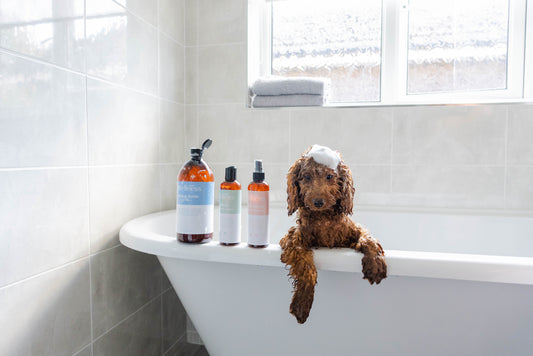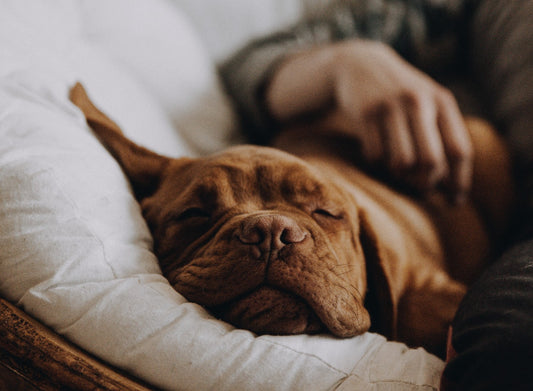It’s happened to most of us, we’ve come home to bite marks in our favourite slippers, or a teddy massacre on the floor! Though it can be frustrating, chewing is a completely natural behaviour for dog of all ages - it's one of their favourite ways to explore the world around them.
In many cases, this behaviour can easily be redirected to avoid your pup destroying any items of value. However, destructive chewing can be a sign of a more underlying problem, such as anxiety, pain or boredom.
Once you figure out the reason for your dog’s destructive chewing, there are a number of ways you can go about fixing the problem. And we're here to help with this!
- Why do dogs chew?
- What is destructive chewing?
- What causes destructive chewing?
- Dangerous items that dogs commonly chew:
- How to stop a dog from chewing everything:

Why do dogs chew?
We all know that dogs love to chew, it’s one of their natural instincts - especially as young puppies. The main reasons why a dog loves to chew are:
1. Exploration
Puppies, very much like their human counterparts, love to explore the world by putting everything in their mouths. You will also find that newly adopted dogs may also do the same as they settle into their new surroundings.
2. Health & Wellbeing
For puppies, chewing can help ease the pain associated with teething. For older dogs, chewing is nature’s way of keeping their jaws strong and teeth healthy.
3. Fun!
It can be as simple as the fact that dogs just enjoy chewing. You may have presented them with a chew toy as a reward and praised them when they chewed it, so they now associate this positive reinforcement with their chewing.
4. Boredom
If your dog isn’t getting enough mental stimulation, they can redirect this boredom into chewing, and if you’re not careful, it can be furniture or other items you definitely don’t want them to chew.
5. Anxiety & Frustration
If your pup tends to only chew excessively when they are left alone, this is definitely a sign of some form of separation anxiety.
Excessive chewing can also come from frustration or a fearful situation. If there is a dog they want to play with but can’t, or they see a cat outside but they can’t chase it, this can lead to them taking out that pent up frustration on their chew toy (or your furniture!).
What is destructive chewing?
Destructive chewing is simply defined as any chewing your dog does which results in them destroying objects that you value.
Dogs love to chew, and the aim isn’t to get them to stop chewing, but more to address any issues and redirect them to chew their own toys and treats.
When chewing leads to the destruction of objects around your home, like furniture, shoes, clothing etc. this could be linked to other problems your dog may have.
What causes destructive chewing in dogs?
Separation Anxiety
If your dog’s chewing gets worse when they are left alone and it starts being directed to objects other than their own toys, this is a sign that they suffer from separation anxiety.
They use chewing as a way to relieve the stress they have from being alone. This can be in addition to other symptoms of separation anxiety such as barking, whining, restlessness and going to the toilet inside.
Pain
Chewing can be intensified in puppies as they through their teething stage. Much like human babies, as the new teeth are coming through, they can experience pain and discomfort in their mouths which can be relieved by chewing on something.
Boredom
If your dog does not receive as much exercise or mental stimulation as they should, they can become frustrated. An abundance of pent up energy with a lack of activity can lead them to direct this frustration and boredom into excessively chewing items you don’t want them to.
Dangerous items that dogs commonly chew:
Although chewing can be a satisfying activity for your dog, helping them relieve anxiety and prevent boredom, chewing on the wrong thing can lead to a number of harmful issues, such as fractured teeth, intestinal blockages and constipation - resulting in a large vet bill.
Avoiding any items small enough for your dog to swallow and cause an obstruction is imperative, this is what can lead to very severe blockages and resulting in potential surgery for removal.
There are many hard objects that you should also avoid letting your dogs chew on as this can results in fractured teeth.
While many of these objects may seem to be harmless items, you should avoid letting your dog have access to them:
Sticks 🌲
The harm here comes when your dog starts using the stick as a chew toy. Wood splinters can prove extremely harmful to dogs, getting wedged in dogs gums and leading to infections.
Furthermore, if your dog ends up swallowing sticks these can get stuck along their digestive tract and cause some severe blockages and damage.
Bones 🦴
Like sticks, if cooked bones run the risk of splintering in your dogs mouth and causing damage.
If you want to give your dog bones, do your research, make sure they are raw, and make sure they are big enough so your dog cannot attempt to swallow them, and once it has been chewed down enough, take it away from the dog to avoid them swallowing it.
Water Bottles 💧
Although you may think they are an easily available dog toy, and dogs love to chew on water bottles, there are a number of dangers that can arise.
If your dog manages to remove the cap, they could end up swallowing this and causing a blockage. Also, they can tear through water bottles very easily, leaving some very sharp and rough edges. These edges can either lead to them cutting their gums, or swallowing sharp pieces of the bottle and causing damage further down their throat.
How to stop a dog from chewing everything:
So although chewing is a natural and fun behaviour for dogs, if your dog is a destructive chewer you will need to find the cause for this and address it. Here are a number of things you can do to help keep their chewing habits under control:
1. ‘Dog proof’ your home
Just like you need to ‘baby proof’ a home, the same process is needed for bringing home a dog. Ensuring that any items that you don’t want chewed, such as shoes, books, clothing, are out of their reach is the best place to start.
Be careful, even things that appear out of reach may still be attainable to a dog that wants it enough
2. Exercise and mental stimulation
Ensuring that your dog gets plenty of daily exercise is vital for their wellbeing. Without enough mental stimulation, dog’s can easily get bored and look for ways to release their pent up energy. This can often be chewing something you don’t want them to.
Making sure they get their daily walks, as well as other forms of engagement such as puzzles or even playing games of fetch with them can help keep their minds happy and content, and tire them out too much to want to chew anything.
3. Redirect the behaviour
If you catch your dog chewing on something they shouldn’t be, it is important not to punish or scold them. Instead, redirect them with a more appropriate toy that they are allowed to chew on and praise them when they do. This will encourage them to go for their own toys instead of your items in the future.
If what they’ve got is too valuable to them and they won’t swap with you, try using some high value treats and teaching them the command ‘Give’ or ‘Drop’ instead.
Punishing your dog can lead to increasing their anxiety and stress levels, resulting in an increase in excessive chewing. Eventually, puppies calm down and their chewing habits should change.
4. Find appropriate toys
Provide your dog with plenty of different chew toys, edible and inedible. The more options they have of their own toys to chew, the less likely they are to chew your things.
It's a good idea to rotate the dog toys you give your pup to provide them with variety and prevent them from becoming bored quickly.
It’s important to make sure they are always supervised though when left to chew on something as to avoid any mishaps. Better yet, you can engage in play with your dog to strengthen your bond!
Avoid giving your dog old shoes or socks as a toy as they will then think it is okay to chew your current shoes and socks. They don’t know the difference between them, so it's unfair.
5. Freezing toys
Freezing a rubber toy for a teething puppy is the perfect cure to soothe sore gums.
6. Confine them
If you are leaving them alone for a period of time and are worried about them chewing things they shouldn’t, it is best to keep them confined to either a specific room where there is nothing they can chew, or in a crate.
7. Use repellants
If there is something in particular that your dog really loves to chew, and no matter how much you try and redirect, you just can’t get them to stop, you could try aversive sprays. Bitter Apple is non-harmful to dogs, but highly repulsive, so hopefully a few sprays of this on the sofa arm they keep chewing will stop them in their tracks.
8. Be patient with them
It is so much easier to train a dog what to chew as opposed to not chew. You need to be patient with them and give them time to learn what they should and shouldn’t do.
Set them up for success, give them a balanced life, don’t lose your temper with them and you’ll get there eventually.
🐶
It is more than likely that at some point in your dog’s life, they will chew something you don’t want them to. Just follow these tips and remember that they aren’t chewing things to annoy you, there could be an underlying problem and it is possible for you to teach them right from wrong.


